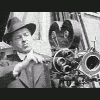Weatherbird
by Gary Giddins
Benny Carter, 1907-2003
A Gentleman You Didn't Mess With: The King and His Honors and His Many Revolutions
August 20 - 26, 2003
en years ago, a woman from the Kennedy Center Honors called to pick my brain. The committee, she said, had decided that a jazz artist should be among the next group of honorees. At that time those awards for lifetime achievement in the performing arts had only recently become the sick joke they remain today. Good intentions had been subverted by TV, so that genius itself was insufficient to warrant recognition. Additional criteria included popularity and/or tokenism: The winners' circle required a woman, a black, a Jew or other ethnic, an unthreatening highbrow, a pop or film star. Everyone knew that. Still, I could hardly believe this woman's candor.
Peggy Lee had been suggested, she said. Was she worthy? I told her Peggy Lee deserved all kinds of awards, but pointed out that she was a tangential figure in jazz and that genuinely great jazz figures ought to have priority. Such as? The obvious choice, I told her, was Benny Carter—a patriarchal figure in his early eighties whose achievement was beyond dispute.
She laughed: "That's so funny, I just hung up the phone with Quincy Jones and he said exactly the same thing."
"So what else do you need to know?"
"Well, I'm sure he's deserving, but we can't give a Kennedy Center Honor to Benny Carter."
"Why not?"
"This is for television. No one's ever heard of him."
They ignored jazz that year. Yet Hollywood forces led by Jones and Leonard Feather mounted a campaign on Carter's behalf, and, taking advantage of President Clinton's purported love of jazz, succeeded in getting him selected in 1996. Four years later, Clinton awarded him the National Medal of Arts.
Carter—who died on July 12, a month short of his 96th birthday—never lacked awards. The Times obit showed him sitting before a wall of plaques, statuettes, Grammys, citations, and medals. That he never achieved much popular renown was partly a result of career choices that buried him in Hollywood studios for two decades, and his intransigence about what he would and wouldn't do. He was often neglected by jazz fans and critics as well. Among musicians, however, he was known as The King. No one in jazz history—including Armstrong, Ellington, Gillespie, Parker, you name him or her—was more universally admired by his brethren.
Much of the regard had to do with his demeanor, a sober mix of modesty and authority. He was invariably referred to as a gentleman, which meant two things: that his manners were impeccable and that you didn't mess with him. He could cut you on the bandstand and off, but sweetly and with a smile. I once saw him negotiate a record deal over dinner. An executive wanted him to forgo union-mandated arranger fees. Benny calmly changed the subject to the label itself; it wasn't one of those fly-by-night bargain operations, was it? "Absolutely not," the exec boasted. "We do not discount, everyone pays full price." "And yet," Benny said, thoughtfully chewing, "you want a discount from me." End of discussion. While recording Carter's 1961 masterpiece, Further Definitions, the producer asked Dick Katz to put "a little more Basie" in his solo. Benny countered, "I want to hear more Dick Katz in that solo!" At a 1987 session with the American Jazz Orchestra, he interrupted a soloist who quoted a pop song, admonishing, "Please don't play other people's music when you're playing my music," which had the instant effect of making everyone in the band focus more intently on their improvisations.
Carter was notoriously reticent with journalists. Being a gentleman, he agreed to an interview for Ken Burns's Jazz, but being Benny he gave him almost nothing to use. Off mic, he was generous with his time and wisdom; on mic, he seemed to find too many complexities lurking behind every question, inclining him toward monosyllabic responses. I once tried to get him to concede his contribution as musician, arranger, composer, bandleader. "I don't know. And I'm not being modest," he said: "Contribution to what—to my livelihood?" Yet he enabled Morroe Berger, Edward Berger, and James Patrick to write the recently revised two volumes of Benny Carter: A Life in American Music, an essential work of jazz scholarship.
Here's a short version. Along with Johnny Hodges, he established the alto saxophone as a major instrument, forging a style as timeless in 1985 ("Lover Man") as in 1933 ("Krazy Kapers"). He was also an exceptional clarinetist ("Dee Blues," 1930) and trumpeter ("More Than You Know," 1939). By 1930, he was in the vanguard of big-band composers, helping to codify what would become swing's style and substance. He tore away the baroque ornamentation of dance bands, streamlined rhythm, and established a parity between composition and improvisation in such classics as "Blues in My Heart," "Symphony in Riffs," "When Lights Are Low," "Lonesome Nights," and his payoff hit, "Sleep." His three years in Europe before the war permanently changed the face of European jazz. Unlike many contemporaries he greeted Charlie Parker as an innovator and not a threat; his bands gave a big hand up to J.J. Johnson, Max Roach, Art Pepper, Dexter Gordon, and Miles Davis. He crashed Hollywood's racial barriers as the first African American to score top films and TV. Sixty years ago Carter said, "Every year more and more people turn from the European culture to the American. That's why swing and dance music in general continue to improve so consistently."
_forumlogo.png.a607ef20a6e0c299ab2aa6443aa1f32e.png)

